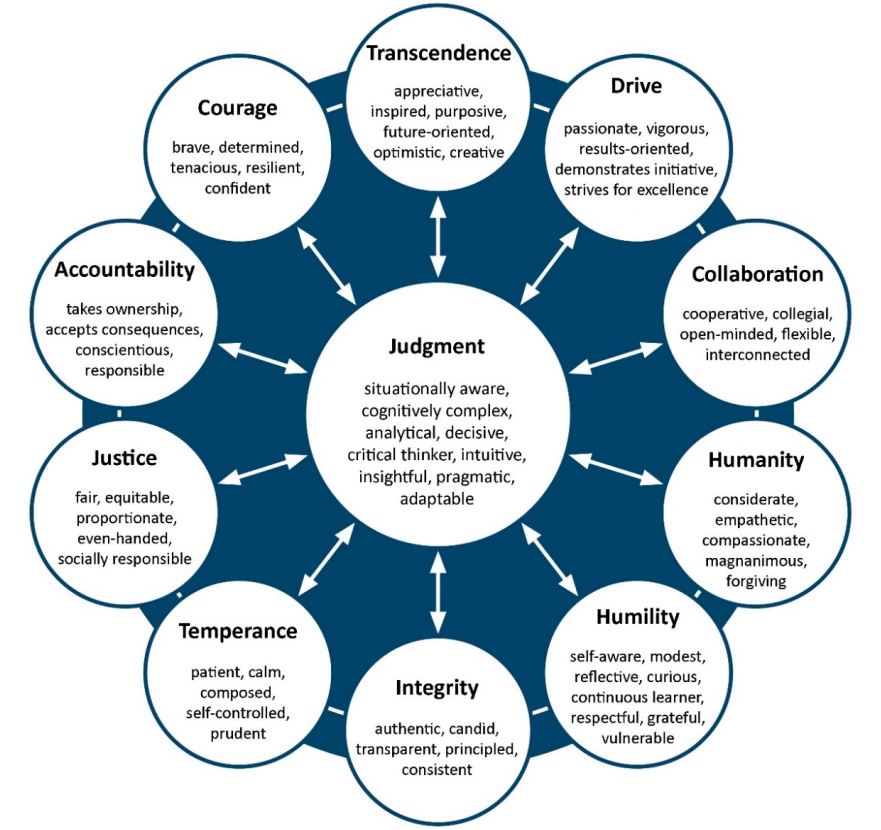A Simple Mindfulness Practice to Develop Leader Character
Mindfulness is receiving a lot of attention in the media and for good reason. Regularly practicing mindfulness meditation can physically change the brain,1,2 with studies showing improvements in regions of the brain associated with attention and emotion regulation. Mindfulness may be particularly beneficial for people who are faced with making decisions under rapidly changing circumstances. A study published in the Consciousness and Cognition journal suggests that attentional performance and cognitive flexibility are positively related to meditation practice and levels of mindfulness.3
A major obstacle to practicing mindfulness consistently is a lack of time. Fortunately, there are mindfulness practices that can be integrated into each day. Mindfulness involves paying attention to what is happening in the present moment with an attitude of openness, kindness, and curiosity. While some people seem to be more mindful than others, it can be strengthened through practice.
Like mindfulness, leader character also requires consistent practice to develop. Leader character consists of the traits, values, and virtues that support individual well-being and organizational excellence. In the leader character framework shown below, there are 11 dimensions of leader character. Judgment, shown in the center, is not only critical for helping leaders to make wise decisions, but it supports the other dimensions by helping to identify when a specific character strength is required. For example, during a meeting where a colleague is presenting a new idea, you may recognize through the character strength of judgment that transcendence is required in order to appreciate the idea and connect it to your organization’s strategic goals, and that humility is required to ask insightful questions about the idea.
To learn more about why character is important, read Why Character is Important for Leadership. In the meantime, we’re going to share a simple mindfulness practice that can help develop leader character by encouraging more intentionality about when to draw on appropriate character dimensions for different situations.

What is Mindfulness?
Mindfulness involves paying attention to what’s happening in the present moment with an attitude of openness, kindness, and curiosity. It’s a way of interacting with the present moment, which means it can be practiced anywhere and anytime. While some people seem to be more mindful than others, it’s a skill that gets stronger with practice.
Did you know? People who practice mindfulness meditation have been shown to experience reduced stress, increased well-being, are more likely to be compassionate towards themselves and others,4 and may even have more adaptive immune system responses.5
2 Steps to Becoming a More Mindful Leader
In a Psychology Today article, Dr. Ryan Niemiec shares a brief mindfulness exercise he calls “The Mindful Pause.”6 The exercise has two steps:
- Begin by pausing and feeling your in-breath and out-breath for 10-15 seconds.
- Conclude with a question: Which of my character strengths will I bring forward right now to support myself and others in this situation?
By practicing the mindful pause on a regular basis, you are more likely to become aware of when you need to call upon specific leader character dimensions. Over time, this practice will become habitual and require less effort. You’ll soon see the benefits of this practice not only in yourself, but in the people you work with as you bring forward the dimensions of leader character more regularly.
Download a free resource that summarizes this exercise here.
Find Your Leader Character Strengths
If you have questions about your scores or would like to learn more about leader character, contact SIGMA leadership consultant Ruby Nadler. Ruby has extensive experience in mindfulness and positive psychology and uses her knowledge to support leaders to hone critical competencies, including judgment and decision-making skills, interpersonal skills and emotional intelligence, and stress reduction. She would be happy to discuss your results and tell you a more about the LCIA.
Talk to Ruby

Ruby Nadler, Ph.D., Leadership Consultant
Ruby has a Ph.D in Cognition and Perception, as well as specific training in mindfulness and positive psychology. She brings this expertise to SIGMA’s executive coaching programs. In 2015 she was awarded a two-year Ontario Centers of Excellence TalentEdge Fellowship, and her research has been featured on CBC, BBC Radio, Happify, and NPR. Call or email Ruby – she would be happy to answer questions about the LCIA, leader character, coaching, etc.
Phone: 1-800-401-4480 ext. 223
1 Davidson, R. J., Kabat-Zinn, J., Schumacher, J., Rosenkranz, M., Muller, D., Santorelli, S. F., … & Sheridan, J. F. (2003). Alterations in brain and immune function produced by mindfulness meditation. Psychosomatic Medicine, 65, 564-570.
2 Hölzel, B. K., Carmody, J., Vangel, M., Congleton, C., Yerramsetti, S. M., Gard, T., & Lazar, S. W. (2011). Mindfulness practice leads to increases in regional brain gray matter density. Psychiatry Research: Neuroimaging, 191, 36-43.
3 Moore, A., & Malinowski, P. (2009). Meditation, mindfulness and cognitive flexibility. Consciousness and Cognition, 18(1), 176-186.
4 Chiesa, A., & Serretti, A. (2009). Mindfulness-based stress reduction for stress management in healthy people: A review and meta-analysis. The Journal of Alternative and Complementary Medicine, 15, 593-600.
5 Davidson, R. J., Kabat-Zinn, J., Schumacher, J., Rosenkranz, M., Muller, D., Santorelli, S. F., … & Sheridan, J. F. (2003). Alterations in brain and immune function produced by mindfulness meditation. Psychosomatic Medicine, 65, 564-570.
6 Niemeic, R.M. (April 28, 2016). The Mindful Pause: How to Help Others. Psychology Today. Retrieved from https://www.psychologytoday.com/ca/blog/what-matters-most/201604/the-mindful-pause-how-help-others.